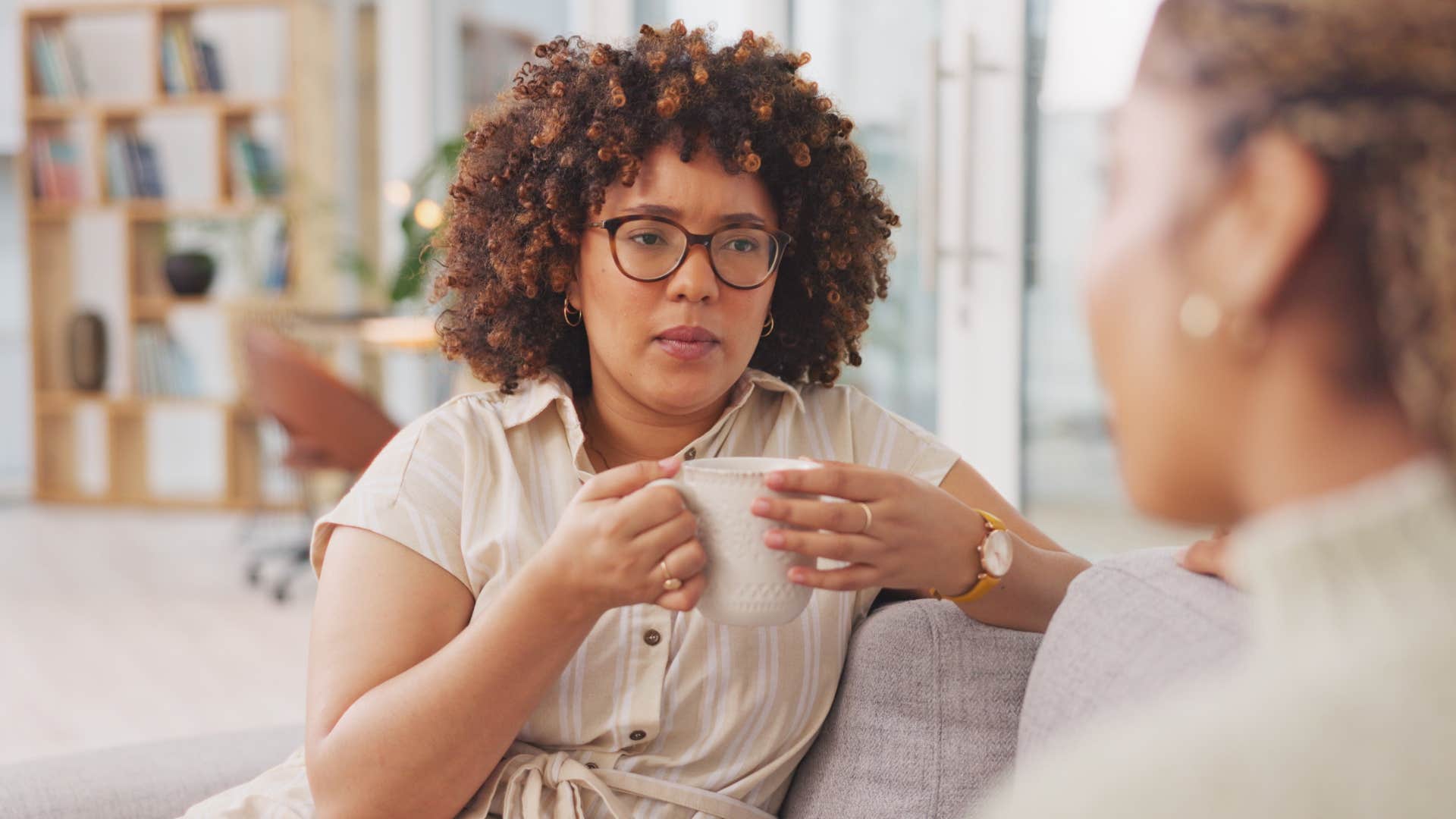People Who Feel Awkward In Their Own Friend Group Usually Notice These 11 Things First
There's not much that's worse than feeling like you don't belong with the people who you're supposed to be closest to.
 Lighthunter / Shutterstock
Lighthunter / Shutterstock Having solid friendships you can rely on is important. You need people who will be there for you no matter what. Unfortunately, there are times when things can start to feel uncomfortable. Even when you’re with your own friend group, you may feel awkward and out of place. While everyone may experience this from time to time, feeling it on a regular basis is a red flag.
Sometimes, there are things you can do to fix this. For example, licensed clinical psychologist Joel Minden, PhD, said that you can check in with yourself and others when things feel awkward to gauge the situation. “Accept that — and then redirect your attention and behavior to the other person,” he said. “Socially effective people show interest in others and their interactions.” However, at other times, there’s simply nothing that can be done. Perhaps you’ve outgrown a relationship or a group of friends, and things are bound to feel awkward. Before you reach that point, there are some subtle signs you might notice.
People who feel awkward in their own friend group usually notice these 11 things first
1. Feeling judged
 PeopleImages.com - Yuri A | Shutterstock
PeopleImages.com - Yuri A | Shutterstock
One of the first things people will notice when they feel awkward in their own friend group is a feeling of judgment. Every little thing they do will feel like it’s under a microscope for the group to examine and pick apart. They will feel less welcome in the group because they are facing judgment for everything they do, big and small.
Licensed clinical psychologist Seth Meyers, PsyD, explained that judging your friends to some degree is only natural. “In my clinical work, I have found that men and women do judge their friends, regardless of what any of us wants to believe,” he said. “One important observation I’ve made is that the things we judge friends for don’t … differ much from the types of things for which we judge others.”
Some judgment in friendships is going to happen because we’re all human, and that’s what humans do. But if someone feels like they are being unfairly targeted by the judgment of people who are supposed to care about them, there’s a good chance that they’re starting to feel awkward. Those feelings are likely to grow as time goes on, until someone feels truly awkward in their friend group.
2. A lack of connection
 fizkes | Shutterstock
fizkes | Shutterstock
When you’re close with your friend group, you’re probably going to feel very connected to them. People who feel awkward in the group often struggle to relate. They don’t feel close to their friends, and they don’t feel like they have a strong connection to them. This can feel incredibly isolating. There’s nothing worse than feeling like you don’t belong in your own friend group.
Psychosocial rehabilitation specialist Kendra Cherry, MSEd, noted, “People who lack this sense of belongingness have been shown to be more susceptible to behavioral and mental health problems. Studies have found that those who feel that they belong are happier and less prone to anxiety, depression, hopelessness and loneliness.”
Without a sense of connection, you’re more likely to struggle with your mental well-being and happiness. When someone feels awkward in their own friend group, they have few places left where they can feel that sense of connection and belonging. For some people, their friend group may have been the only place they found that. This puts people in a precarious and unfortunate situation.
3. Overthinking everything
 PeopleImages.com - Yuri A | Shutterstock
PeopleImages.com - Yuri A | Shutterstock
Another thing someone will notice when they feel awkward in their own friend group is that they will overthink everything. They can’t simply act natural and be themselves. Instead, they’re left to wonder if their friends are scrutinizing everything they do, because they’re certainly scrutinizing it themselves. Every word, joke, laugh, and gesture suddenly becomes something to second-guess.
Registered psychologist Rod Mitchell said that overthinking can be a sign of friendship anxiety. “This type of anxiety can make it hard to form or maintain friendships,” he said. “It might lead to avoiding social events or struggling to relax around friends. Friendship anxiety can affect anyone, regardless of how many friends they have or how outgoing they seem.”
If someone is overthinking and over-analyzing everything they do and everything they experience, they are likely dealing with anxiety that could come between them and their friend group. When you overthink, you don’t feel secure in how you’re acting and what you’re doing. It’s hard to feel comfortable around others when you feel this way, no matter how close you are or how much you should feel like you can share anything with them.
4. Feeling excluded
 fizkes | Shutterstock
fizkes | Shutterstock
When someone feels awkward in their own friend group, they’ll probably feel excluded by the other members of the group. Maybe they’ll notice that their friends are doing things without them, or they’ll just feel like they don’t really fit in when they are together. Everything from inside jokes they weren’t a part of creating, to plans that mysteriously don’t include them can make them feel this way.
Psychotherapist Tina Tessina explained why this can be so hurtful. She said, “When people you like, or admire, or want to feel close to exclude you from conversations, activities and invites, they’re signaling — intentionally or unintentionally — that you’re not important to them.”
This idea that you’re not important to the people who are supposed to be your close friends can really sting. Something that can make this even worse is when friends try to cover up the exclusion. Maybe they hung out without you, but they didn’t want you to know. You still found out, of course, and that’s what hurts worst of all. Being excluded by friends is something no one wants to experience, and it can definitely lead to some awkwardness.
5. Having a hard time relating to each other
 GaudiLab | Shutterstock
GaudiLab | Shutterstock
When your relationship with your friend group is solid, you feel close to them and like you have no problem relating to them. You all get along and are on the same page. That’s how you want it to be in a friendship, but it doesn’t always stay that way. When you enter an awkward phase, you’ll probably have a hard time relating to your friends, and they’ll have a hard time relating to you in return. The connection just won’t be the same.
Clinical psychologist Arlin Cuncic, MA, shared that this is normal to some extent, especially in adulthood. It’s just not as easy to make and maintain friendships as it was when you were a kid. This is a difficult reality to deal with. “People want to be liked, and people want (and need) friends,” she said. “But sometimes, life gets in the way, and many find themselves unable to make any new friends or keep the friendships that are already there.”
Someone who can’t relate to their friends may find that previous shared experiences no longer mean the same thing, or that the connection they once had just isn’t as deep. Instead, they feel distant and like they’re getting mixed signals from their friends. Things just aren’t the same as they used to be because they’re veering into awkward territory.
6. Feeling self-conscious
 Nicoleta Ionescu | Shutterstock
Nicoleta Ionescu | Shutterstock
You know how it feels when you can be completely authentic and vulnerable in front of your friends — like you don’t have to hide any parts of yourself? It’s great, right? Having people you can trust that much and feel so safe around is a big blessing. Going from feeling that way to being self-conscious and insecure around your friend group is a sign that things are starting to get awkward.
Of course, feeling a little self-conscious in social situations is to be expected, as Cuncic pointed out. She defined it as follows: “Self-consciousness refers to a tendency to be preoccupied with your own appearance or actions, particularly about how you think others might perceive you. This heightened awareness of the self can contribute to distress, discomfort and anxiety.”
Suddenly feeling that way around people you were previously comfortable with is a bad sign, though. Feeling self-conscious is natural, but it isn’t something that anyone really likes. And, of course, everyone needs people that they can depend on to accept them for who they truly are, flaws and all. There’s no need to feel self-conscious around them. If that changes, someone is probably feeling awkward in their friend group.
7. Avoiding the group
 fizkes | Shutterstock
fizkes | Shutterstock
Normally, it feels like you can’t be around your friends enough. You wish you had more time with them, to be together constantly. If someone stops feeling this way and instead begins to avoid their friend group, it’s a pretty clear sign that they’re no longer comfortable with the group. Why else would they stay far away from the people they used to love being around?
Sometimes, you simply have to let go of friendships because they aren’t the right fit for you anymore. “Maybe your politics have diverged,” Karen Sosnoski, PhD, said. “Or your interests. Or one of you has entered a different life stage that the other is finding [it] difficult to be present in — for instance, having kids while your friend is single. If it has become challenging to spend time together, it’s possible you’re moving away from each other naturally.”
If you find yourself avoiding your friend group, maybe that means that it truly is time to move on. It’s possible that you’re just not meant to continue the friendship and move forward with your lives intertwined. The logic behind the decision doesn’t make it hurt any less, though. Losing friends is painful, no matter what age or stage you’re at. But if you’re avoiding the group, that’s probably where you’re headed.
8. Forcing conversation
 PeopleImages.com - Yuri A | Shutterstock
PeopleImages.com - Yuri A | Shutterstock
Talks with your friend group should feel natural and spontaneous. If it feels like you have to force a conversation and work extra hard to keep it going, you may be pulling apart and feeling the beginning of awkwardness. No one likes a forced conversation, no matter which end of it they are on. Feeling like you can’t be yourself and talk freely around your friend group is a massive red flag.
In a separate article from YourTango, Meaghan Summers wrote about the role of small talk in these kinds of awkward conversations. “When you meet someone new, though, or just don’t feel like carrying on a full conversation with someone (be they a friend, family member or average stranger), small talk makes [its] way into your life again,” she said. “This is because it fills the gaps between profound conversation and banal talk.”
Small talk is fine. There’s certainly nothing wrong with it. However, when you’re with your close friends, you’re probably going to want to have a conversation that goes beyond what the weather is like. If you just can’t, or you or your friends have to force a conversation that goes beyond basic pleasantries, things are probably getting awkward.
9. Feeling like an outsider
 Christian Moro | Shutterstock
Christian Moro | Shutterstock
If someone feels awkward in their own friend group, there’s a good chance they feel like an outsider. They may still get together with everyone and hang out, but they just don’t feel like they’re a part of the group. Instead, they’re sort of just there while everyone else feels included and has a great time. They’re on the periphery and they know it, and, really, everyone else does too.
Licensed psychologist Jonice Webb, PhD, described what it’s like to feel like an outsider. “Sometimes, this ‘outside’ feeling can dampen their ability to enjoy themselves,” she said. “Some of my clients have left events early because of it. Many have described the pang of longing as they look around and notice other people laughing and conversing with ease, wishing they knew what was missing for them.”
Feeling like you’re an outsider messes with your mind and affects your ability to have a good time. It makes you feel like you are unloved and unwanted. It’s an awful feeling, and no one should feel that way when they’re with their friends. If you do, things are likely to get awkward and just go downhill from there.
10. Tension
 Srdjan Randjelovic | Shutterstock
Srdjan Randjelovic | Shutterstock
If someone feels awkward in their own friend group, there’s likely a pervasive feeling of tension permeating the group. Everyone feels a little bit off and uneasy. You’re no longer comfortable with them, and they can all easily tell, which makes them uncomfortable in turn. This can lead things to get awkward fast. This can cause the friendship anxiety mentioned earlier.
“When it comes to anxiety, it is best to remember that it always latches on to things you value,” licensed psychologist Dr. Menije Boduryan-Turner said. “Therefore, things we value, such as relationships in our lives, can be an easy target for our anxiety. Ultimately, we are afraid to lose things we value, including our friends. While anxiety in moderation has great value, it can also get out of hand and create unnecessary stress in our lives.”
Friendship anxiety isn’t necessarily a bad thing in all situations. It can just be a sign that you value your friendships and don’t want to lose them. However, if the tension gets too great and you just don’t feel comfortable anymore, you’re bound to feel awkward. When you feel awkward with your friend group and don’t feel safe, it’s a sign that things aren’t good.
11. Feeling like it’s time to pull away
 Nicoleta Ionescu | Shutterstock
Nicoleta Ionescu | Shutterstock
When you know, you know. If you’re truly feeling awkward and uncomfortable in your friend group, it may be time to pull away and move on. It’s hard to go through friendship breakups, but sitting around waiting for things to get better will likely get you nowhere. There’s very little chance things will change, and the situation will reverse itself. You may just have to let go.
Clinical psychologist Roxy Zarrabi, PsyD, said you have to take the necessary time to process your feelings following the loss of a friendship. “If you’re dealing with a friendship breakup, you may feel tempted to move on quickly and distract yourself by focusing on other things, but it’s important that when you feel ready, you take the time to properly grieve the end of your friendship,” she said. “Ignoring grief does not make it go away, and doing so may contribute to you feeling stuck and unable to open up to new friendships over time.”
No one wants to lose a friend or friend group, especially if they were once close, but there comes a time when you have to be prepared to move on. You will naturally grieve and feel a lot of things. It’s not an easy or fun experience. However, removing people from your life who no longer need to be there is a good thing to do that will help you grow and develop even better friendships in the future.
Mary-Faith Martinez is a writer with a bachelor’s degree in English and Journalism who covers news, psychology, lifestyle, and human interest topics.

